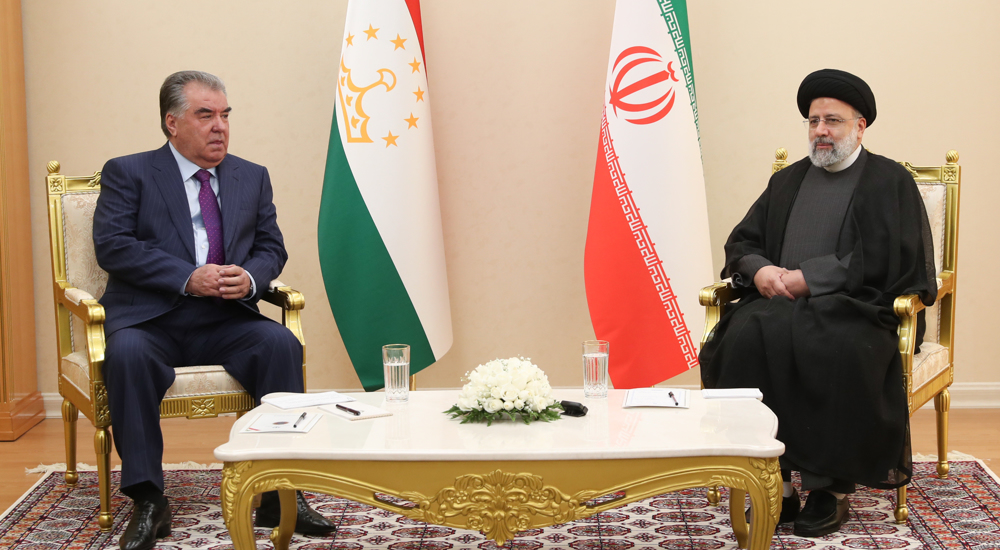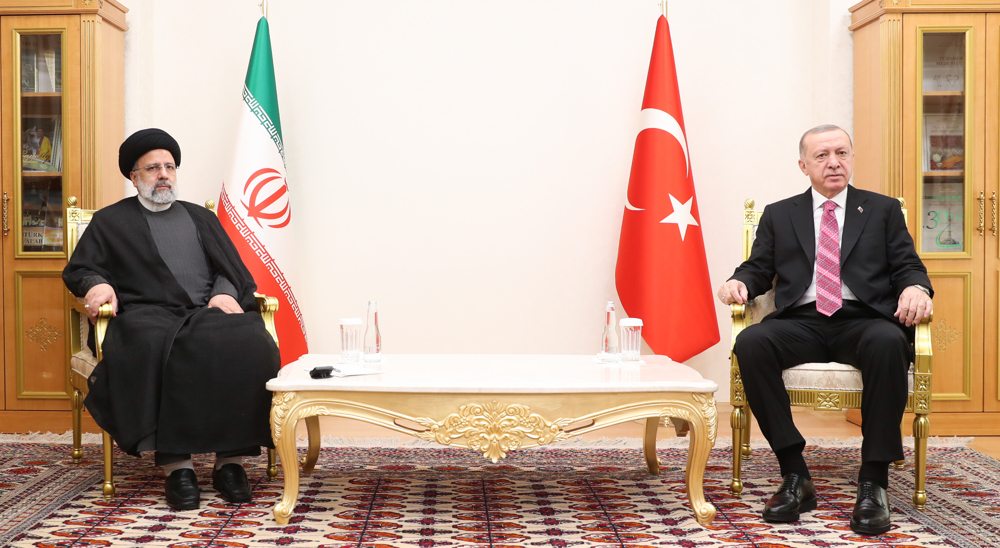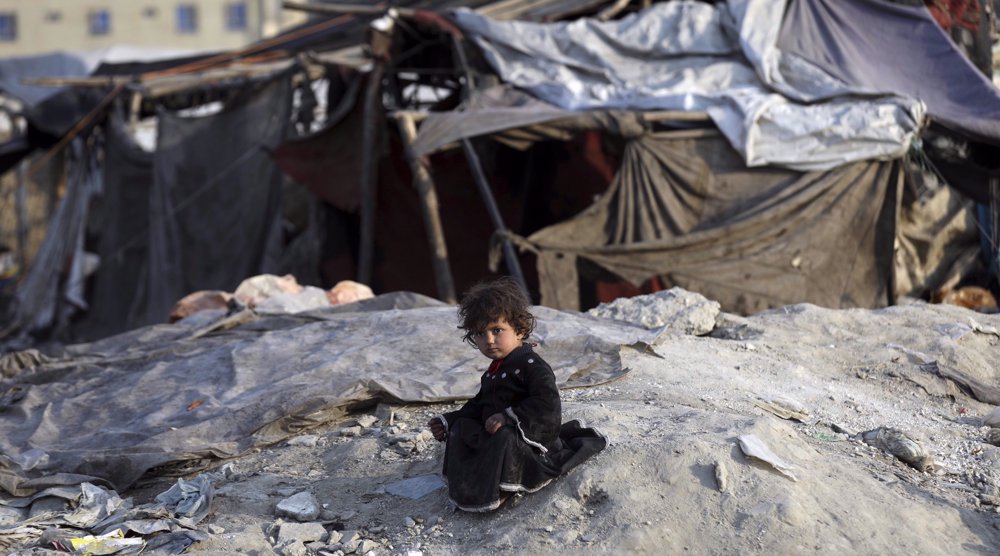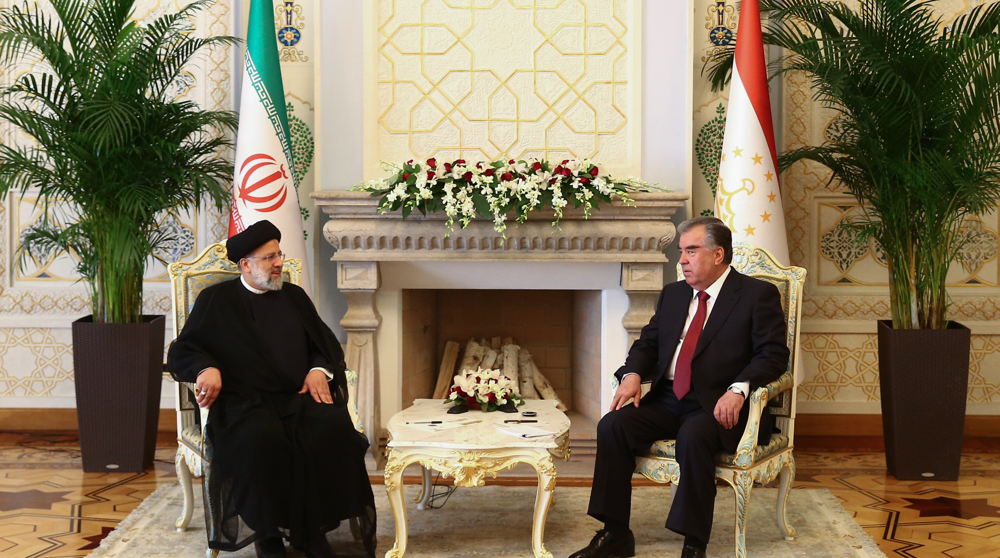Raeisi: Regional problems must be solved by regional countries, foreign presence complicates situation
Iran’s President Ebrahim Raeisi says regional problems must only be solved by regional countries, emphasizing that presence of foreign parties does not help resolve such problems in any way.
Raeisi made the remarks in a Sunday meeting with his Turkish counterpart, Recep Tayyip Erdogan, on the sidelines of the 15th Summit of the Economic Cooperation Organization (ECO) in Turkmenistan’s capital city of Ashgabat.
“Regional problems must be solved by countries in the region, because presence and interference of foreigners cannot help solve these problems, but further complicate the situation,” Iran’s president said.
Iran's chief executive then expressed concern over the presence of the Daesh Takfiri terrorist group in Afghanistan and the deterioration of security in the war-ravaged country.
“Terrorist groups have not only created insecurity in Afghanistan, but are also threatening security of the region. Therefore, we must not allow terrorist groups such as Daesh and the PKK (the Kurdistan Workers' Party) to endanger security of regional states,” Iranian president added.
Raeisi noted that the Islamic Republic supports establishment of an inclusive government in Afghanistan and believes that all ethnic groups and people from all walks of life should have a part in determining the country's future.
The US invaded Afghanistan in October 2001 following the September 11, 2001 attacks. American forces occupied the country for about two decades under the pretext of fighting against the Taliban. But as the US forces left Afghanistan, the Taliban stormed into Kabul, which was weakened by continued foreign occupation, and took over the Afghan capital.
The Taliban wrested control of Afghanistan in August after a fierce offensive facilitated by a quick withdrawal of US forces from the country. The government of Afghanistan rapidly collapsed on August 15, with President Ghani fleeing the country in the face of lightning advances by the Taliban.
The group has pledged to allow the formation of a broad-based and representative government. Concerns, however, remain given the Taliban’s drawn-out history of violence.
Elsewhere in the meeting, Raeisi stressed the need to promote stability in Iraq and respect the country's territorial integrity, emphasizing that Iran supports a strong and popular Iraqi government.
The Iranian president stressed the importance of close cooperation among Iran, Azerbaijan and Turkey given the trio's numerous cultural and religious commonalities while urging the three countries to prevent any disruption in their relations and to disappoint common enemies by forging closer ties.
President Raeisi noted that Tehran and Ankara have great capacities to increase trade and economic ties, saying, “Iran and Turkey can take economic and political relations between the two countries closer to a strategic level by further boosting mutual trade and current exchanges.”
Erdogan, for his part, said Turkey attaches importance to the expansion of bilateral and regional cooperation with Iran, adding that the two countries can boost relations, particularly in the economic sector.
The Turkish president expressed concern over the current circumstances in Afghanistan, saying that the White House has trained and is arming all terrorist groups in the region, including Daesh and the PKK, and provides them with terrorist equipment in order to cause insecurity across the region.
The Turkish president emphasized that cooperation among all regional states was requisite for the establishment of peace in the region.
Raeisi: US presence in Afghanistan only led to murder and destruction
In another Sunday meeting with his Tajik counterpart, Emomali Rahmon, Iran’s president said the two-decade presence of US forces in Afghanistan had no other outcome for the Afghan nation but murder and destruction.
“Americans were present in Afghanistan for two decades, but its result for the country was nothing except murder and destruction,” Iran's president added.
Describing Daesh as a terrorist group, Iran's chief executive noted that Daesh is responsible for creating insecurity in the region.
"Daesh carries out massacres in the region on behalf of Americans. Cooperation between us will be beneficial to security of the region and Afghanistan and is important from this viewpoint," Iran's president told his Tajik counterpart.

Raeisi said Iran pursues a “clear” line on Afghanistan, adding, “The Islamic Republic of Iran welcomes establishment of a real broad-based government in Afghanistan, which would represent all the Afghan people as well as ethnic and political groups.”
He added that "very good" relations between Iran and Tajikistan would continue in commercial, cultural and economic sectors.
“The current level of [bilateral] exchanges is not convincing and the extent of relations can be multiplied by taking good advantage of the existing capacities between the two countries,” Iran's president said.
The Tajik president, for his part, pointed to worrisome developments in Afghanistan, saying that insecurity in the war-hit country is detrimental to the regional and neighboring states.
Rahmon called for collective efforts to help the Afghan people and different groups of the country live in peaceful co-existence.
Raeisi paid a visit to Tajikistan in September following Iran's acceptance as a full member of the Shanghai Cooperation Organization (SCO) after waiting for years as an observer to join the Eurasian political, economic and security alliance.
Iran: US airstrikes on Yemen war crimes, violation of international law
Yemeni armed forces down F-18 fighter jet, repel US-UK attack: Spokesman
Iran warns against US-Israeli plot to weaken Muslims, dominate region
VIDEO | Public uproar in US against Israeli regime
‘Ghost town’: 70% of Jabalia buildings destroyed by Israel
Mother’s Day: Sareh Javanmardi’s inspiring journey as Paralympic champion and mother
Russia downs over 40 Ukrainian drones as Putin vows 'destruction' on Kiev
VIDEO | Yemen: A bone in Israeli neck












 This makes it easy to access the Press TV website
This makes it easy to access the Press TV website